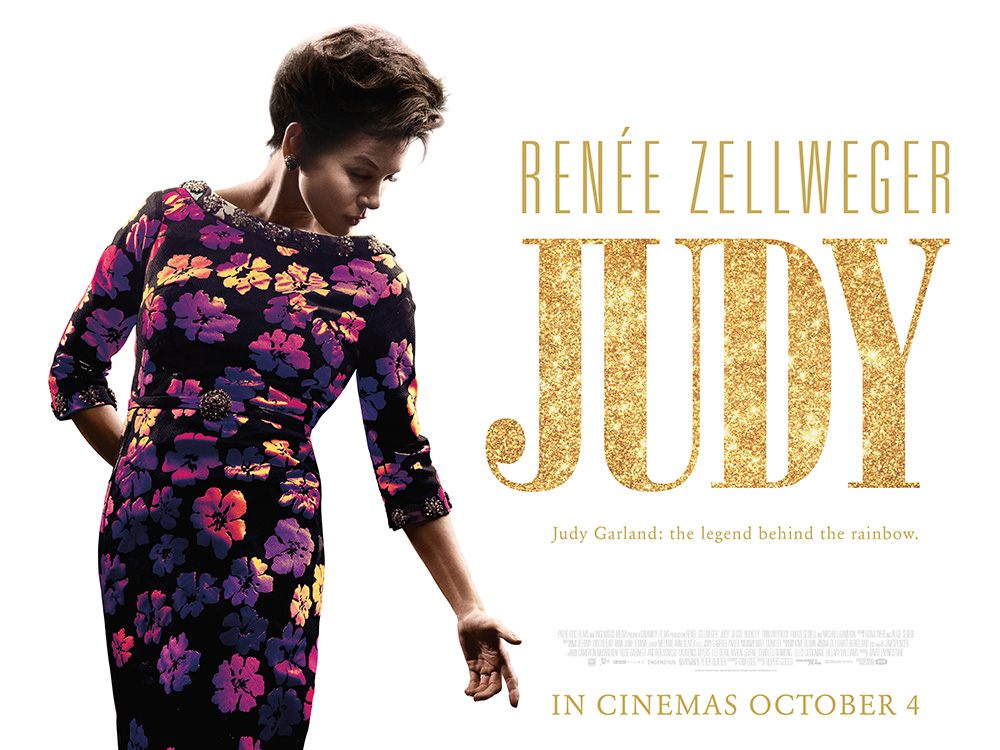Somewhere over a rainbow, a pot of gold lies in wait for studios adapting the trouble lives of stars of today and yesteryear for our silver screen. The much-derived but Oscar-sweeping Bohemian Rhapsody flirted with a billion dollars at the box office last year, while Elton John was the focus of Paramount’s warmly-received Rocketman just a few months ago. Now, seventy years after Judy Garland became a sensation on the back of The Wizard of Oz, and forty years after her tragic death, Garland’s life receives the big-screen treatment in Judy.
Embarking on a sell-out concert tour in London in order to clear the debt she has amounted, Judy recounts Garland's early career on the yellow brick road and the final months before her death at the end of the 60s. Rupert Goold directs the film with Renee Zellweger stepping into Judy’s impressive ruby slippers.
Judy is a competent film held up by Renee Zellweger’s impressive lead performance. When the marketing boasts that “she IS Judy”, it’s difficult to dispute it; she truly transforms into the role — this isn’t a hammy impersonation as so many of these roles can result in, more Taron Egerton as Elton John than Rami Malek as Freddie Mercury. She dazzles without once losing sight of the character — it’s a shame she doesn’t have more to work with as
Holding Judy back is the flashbacks. While they’re well-acted and colourfully-staged - our first glimpse at the Oz’s legendary brick road is particularly magical - they really hinder the film’s momentum, irregularly paced and spliced throughout. They also seem too narrowly focused on the very early days of Judy’s career; covering a larger period of time would have given us a deeper understanding of her career and journey, as opposed to the more binary ‘then’ and ‘now’, as is presented by the film in its current form.
It ultimately lacks a spark — it is very much focused on the negatives in Judy’s life: even when it divulges (a touching moment of her with her fans, exploring her legacy as a gay icon), the scene is bathed in a melancholy that is very rarely lifted. Even those joyous musical numbers are rooted in something saddening that would rather us take pity on Judy, rather than freely celebrate her as one of the brightest stars of stage and screen. I wish the film had found more opportunities to commemorate all the good she had done and achieved, rather than so strictly focus on the dour and doom.
Tom Edge's screenplay, adapted from Peter Quilter's End of the Rainbow, leans so heavily into biopic conventions, assembling a by-the-numbers screenplay with every hallmark going, that it's prevented from hitting the high notes. Likewise, Goold's direction is solid but unspectacular, bringing little visual flair to the story beyond a handful of well-realised moments. Judy is a competent movie - but Renee and Judy both deserve better than that.
Tom Edge's screenplay, adapted from Peter Quilter's End of the Rainbow, leans so heavily into biopic conventions, assembling a by-the-numbers screenplay with every hallmark going, that it's prevented from hitting the high notes. Likewise, Goold's direction is solid but unspectacular, bringing little visual flair to the story beyond a handful of well-realised moments. Judy is a competent movie - but Renee and Judy both deserve better than that.
Summary: Renee Zellweger's impressive performance is trapped by conventions in Judy, a biopic that lacks the spark that earned its titular starlet her legacy. It's a little underwhelming, but not unworthy of a journey down the yellow brick road.
